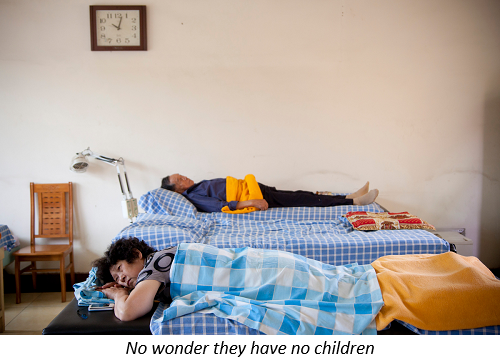CHILDLESS CHINA
 [The most arguably pertinent question to ask of any developing country is: Does this country have time to get rich before it gets old? In China’s case that question has now been answered. The answer is No.]
[The most arguably pertinent question to ask of any developing country is: Does this country have time to get rich before it gets old? In China’s case that question has now been answered. The answer is No.]
China’s total population declined for a second consecutive year in 2023 due to a record-low birth rate and an uptick in Covid-19 deaths. The decline will inevitably deter the economy’s growth potential and continue to strain a nation where the elderly overwhelmingly outnumber the young.
The National Bureau of Statistics, a Chinese government agency, reported that the total number of people in China decreased by 2.08 million in 2023. Overall, the population declined by 0.15 percent, from 1.411 billion to 1.409 billion in 2023. China’s population aged 60 and over reached 296.97 million in 2023, accounting for about 21.1 percent of its total population.
China’s population decline of 2023 is more than double that of 2022, when the population decreased by 850,000. The drastic population drop of 2023 was propelled by a surge in Covid-19 cases that emerged after authorities lifted severe screening and quarantine measures in December 2022. Total deaths in China reached 11.1 million in 2023 — a rise of 6.6 percent.
The last time China experienced such a major population decline was during Mao Tse-tung’s Great Leap Forward from the late ’50s to early ’60s, when death estimates ranged from 23 to 55 million citizens as a result of widespread famine and starvation.
As new births fell 5.7 percent to 9.02 million, the 2023 Chinese birth rate also hit a new record. With only 6.39 births per 1,000 people, the 2023 birth rate was even lower than 2022’s record of 6.77 births per 1,000 people.
Births in China have decreased for decades as a result of the one-child policy, which was in effect from 1980 to 2015. Even after the policy was rescinded, birth rates continued to fall.
The rapid urbanization that took place in the country over the last few decades resulted in large populations moving from rural areas into cities, where bearing and raising children is more expensive. Additionally, youth unemployment hit a record high in 2023, while a crisis in the property sector threatened household wealth.
At the 2023 National Women’s Conference — a Communist Party forum dedicated to women’s issues in Beijing — Xi Jinping called on party officials to promote “love and marriage, fertility and family,” particularly among young people. “We should actively foster a new type of marriage and childbearing culture.”
The decline in birth rates also correlates to a rising number of women in the workforce who chose to remain childless. The state’s enforcement of laws designed to force families to stay together have scared away some women from marriage altogether.
Eighty percent of appeals for divorce are denied in Chinese courts, even in the case of domestic abuse, which is fairly widespread.
U.N. officials predict that China’s population will shrink by 109 million by 2050 — a prediction three times the size of their previous forecast in 2019.
India has remained the most populous country in the world since 2022.
Kayla Bartsch is a recent graduate of Yale University and is embarking on a career in geopolitical journalism

